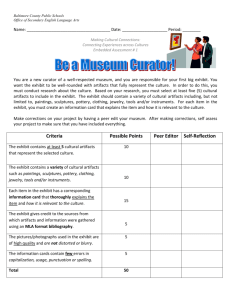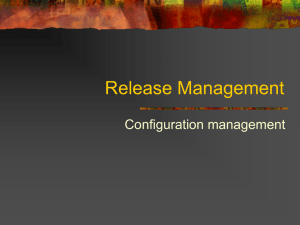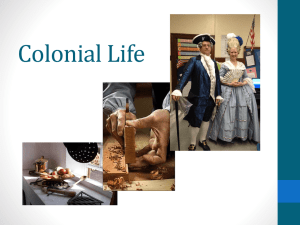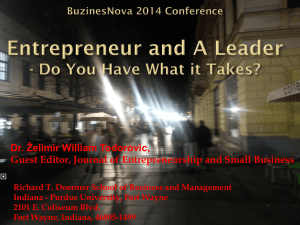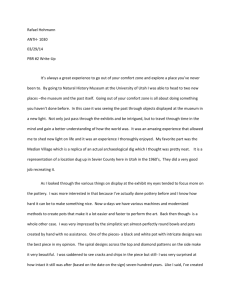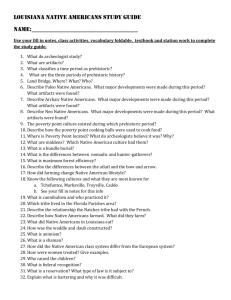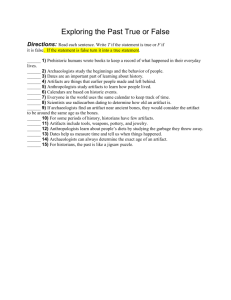museum assignment - Amilee`s e
advertisement
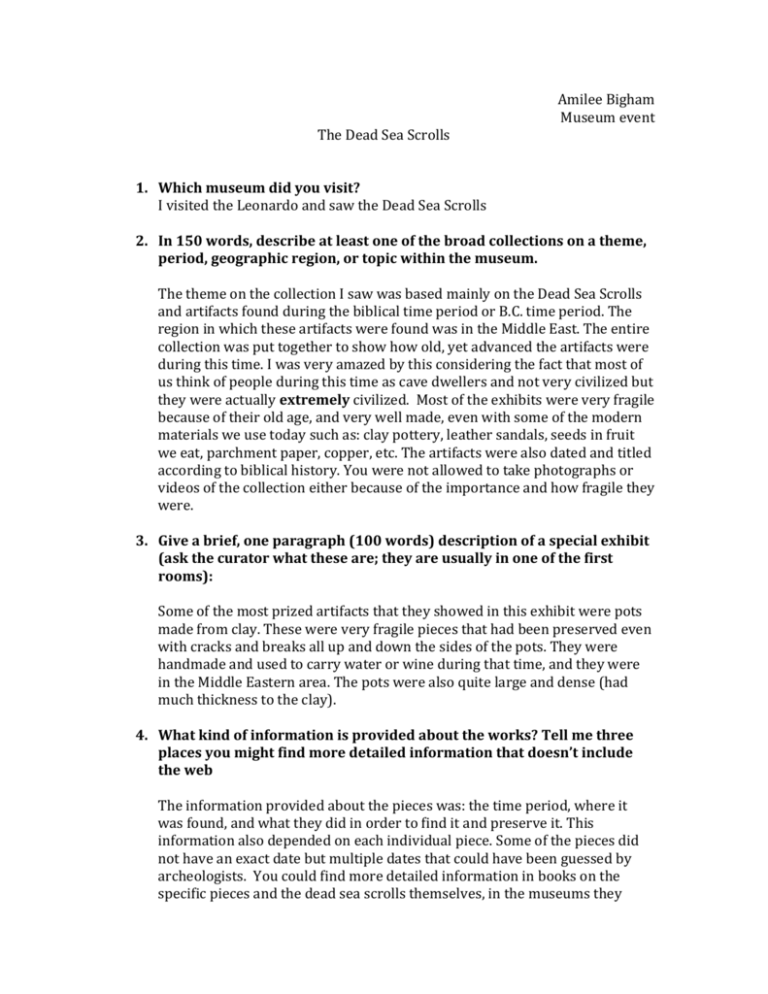
The Dead Sea Scrolls Amilee Bigham Museum event 1. Which museum did you visit? I visited the Leonardo and saw the Dead Sea Scrolls 2. In 150 words, describe at least one of the broad collections on a theme, period, geographic region, or topic within the museum. The theme on the collection I saw was based mainly on the Dead Sea Scrolls and artifacts found during the biblical time period or B.C. time period. The region in which these artifacts were found was in the Middle East. The entire collection was put together to show how old, yet advanced the artifacts were during this time. I was very amazed by this considering the fact that most of us think of people during this time as cave dwellers and not very civilized but they were actually extremely civilized. Most of the exhibits were very fragile because of their old age, and very well made, even with some of the modern materials we use today such as: clay pottery, leather sandals, seeds in fruit we eat, parchment paper, copper, etc. The artifacts were also dated and titled according to biblical history. You were not allowed to take photographs or videos of the collection either because of the importance and how fragile they were. 3. Give a brief, one paragraph (100 words) description of a special exhibit (ask the curator what these are; they are usually in one of the first rooms): Some of the most prized artifacts that they showed in this exhibit were pots made from clay. These were very fragile pieces that had been preserved even with cracks and breaks all up and down the sides of the pots. They were handmade and used to carry water or wine during that time, and they were in the Middle Eastern area. The pots were also quite large and dense (had much thickness to the clay). 4. What kind of information is provided about the works? Tell me three places you might find more detailed information that doesn’t include the web The information provided about the pieces was: the time period, where it was found, and what they did in order to find it and preserve it. This information also depended on each individual piece. Some of the pieces did not have an exact date but multiple dates that could have been guessed by archeologists. You could find more detailed information in books on the specific pieces and the dead sea scrolls themselves, in the museums they have been placed in, and in the middle east itself. If you tie the artifacts to the bible, you can read it to find out what they were used for in specific stories, events, and context. 5. Choose several works that particularly appealed to you. Explain why you were drawn to these works. Comment on the subject, style, medium, time period, etc. Who were the artists? This question must be answered in its entirety. There were many pieces in this exhibit that appealed to me, but the ones that appealed to me most were: the sandals, dead sea scrolls, the pottery, the fabric/tapestries, the bath tub, and the miniature idols. In the exhibit they displayed a couple pairs of worn leather sandals. This was absolutely amazing to me because I had always heard in the bible and church about the people wearing sandals, but I didn’t know that they would have looked so similar to the shoes we wear on our feet today. These people knew how to use the materials they were given. And they obviously knew how to made good shoes to walk with. The next display that amazed me was pottery that was shown. The pots were made from a red terra cotta looking clay that was very hardy. Although fragile, this clay was still alive and well, some of the pots didn’t even have a single crack in them. They were mainly larger, but some of them were small as well, and some also had little carvings added to them either to explain something kind of like hieroglyphics or just for decoration. The fabric and tapestries also intrigued me because of their use of color. Where did the coloring on the materials come from? They had to have used a good type of ink that didn’t fade over this many years. It made me wonder if the time gap from then until now wasn’t as long as scientists made it out to be. The hand woven tapestries were beautifully made with precision and artistic skill, as an artist, I could really appreciate the beauty in each thread. 6. How did the artworks you looked at relate to material we have discussed in class? They do relate in many ways, you just need to look for those relationships. Minimum of 150 words. The pieces that I saw in the museum related mostly to the section about spirituality/religion in our humanities literature books. The exhibit in its entirety was about the Bible: one of the main sources of spiritual, religious, and moral practice guides. The exhibit showed accuracy coming from the bible and how much evidence there really is showing the reality of this book some people don’t quite understand. For me, I really felt empowered and very lucky to have seen this exhibit because it showed me another culture during the time period through the art and innovative ideas with little material to work with. This inspired me greatly with my art and I even wrote about it in my sketch journal. It also inspired me spiritually in my faith because it showed me that there is physical evidence of biblical artifacts. Some people say that their religion is based ONLY on faith, and that is the only explanation they can give for it, but for me, I have seen this tangible evidence that is truly amazing and it gives me more knowledge in Christianity than just believing upon faithfulness. 7. What was your personal reaction to this experience? Would you enjoy attending this type of event again? Why or why not? 100 words My reaction to this event was one of amazement and joy. Seeing this exhibit answered some of my questions about the bible and my faith in a new perspective. A lot of people say that they cannot believe the bible because it has been translated too many times. To see the direct translation from Hebrew to English really answered this question for me. It was very precise in writing characters, and its beauty made me want to learn the Hebrew language. I would definitely enjoy attending this type of event again. I love learning new things about culture and history, and this event brought me that enjoyment. I feel like everyone should attend this type of event at least once in their lifetime if possible because it teaches you about the past and what it was really like. Hearing information is not nearly as credible as seeing something tangible.
